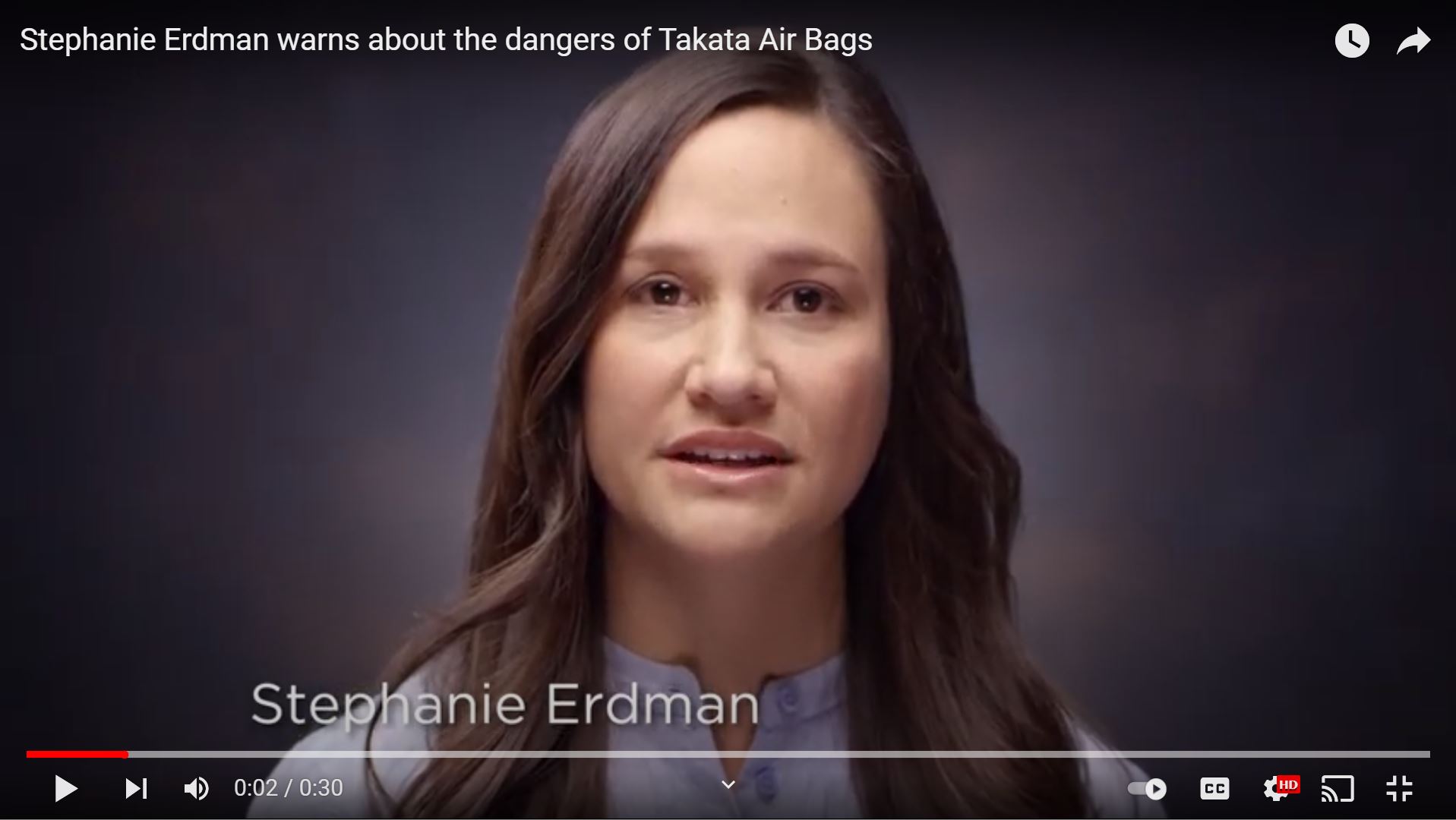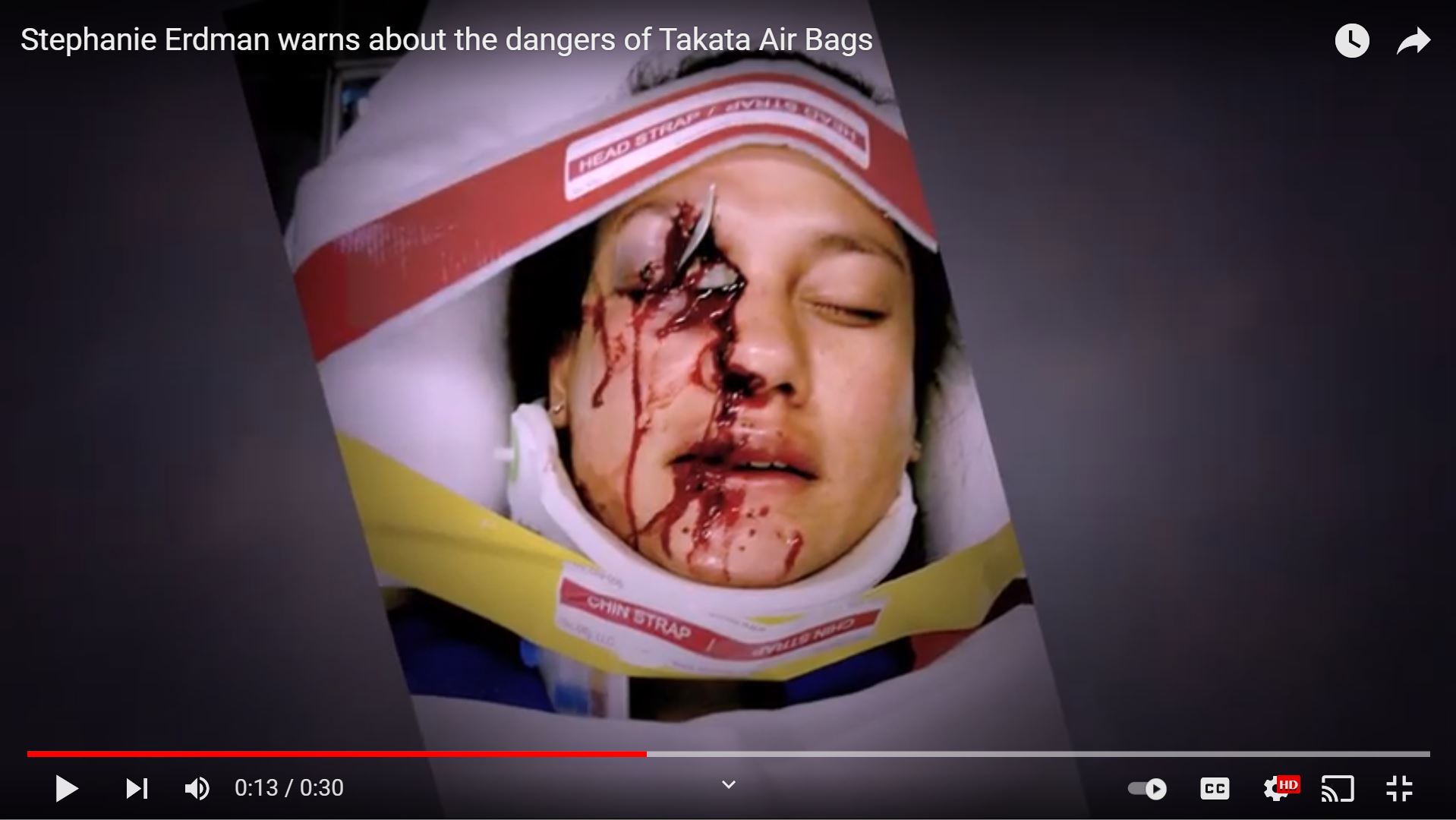
By Rosemary Shahan
6.3 million vehicles currently registered in California
have at least one potentially deadly unrepaired
safety recall defect. Is your car one of them?
You’re doing all you can to make your classroom safe. But what about your own safety? For most teachers, the riskiest part of your day is driving to and from work. Adding to the risk: You and your family may be riding in a car with dangerous unrepaired safety recall defects.
Air Force officer Stephanie Erdman nearly lost an eye when the Takata airbag in her 2003 Honda Civic exploded in a 2013 collision. Corona resident Delia Robles, a 50-year-old grandmother, was not as lucky: In 2017, on her way to get a flu shot, the 2001 Civic she was driving collided with a pickup truck. According to her son, she was driving only 25 mph and always wore a seat belt. Ordinarily, she would have survived. But the Takata airbag exploded upon impact and caused her death. Honda had recalled the car years before the crash, but the defective airbag was never repaired.
Most airbags protect drivers and passengers from serious injuries and death. But Takata used a cheaper, more volatile chemical to inflate its airbags, causing metal shrapnel to slice into drivers’ and passengers’ faces, necks and torsos. Over 100 million airbags in vehicles produced by GM, Ford, Fiat Chrysler/Jeep, Honda/Acura, Toyota/Lexus, Nissan/Infiniti, Subaru, BMW, Mercedes-Benz, Kia, Hyundai and other major auto manufacturers were built with recalled Takata airbags. They have caused hundreds of devastating injuries, including blindness, and dozens of fatalities.
What you can do
How can I find out if my car, or a car I might buy, has an unrepaired safety recall?
It’s easy, and the information is free. All it takes is the car’s Vehicle Identification Number, or VIN, and access to the National Highway Traffic Safety Administration (NHTSA) website, nhtsa.gov/recalls.
Where can I find my car’s VIN?
The VIN is a unique 17-character identifier that’s like a fingerprint for a specific car. It’s located on the left side of the dashboard near the windshield, plus on the vehicle registration, auto repair orders, and auto insurance documents.
Where should I check the safety recall status for my car, or a car I’m thinking of buying?
Simply enter the VIN at the NHTSA website at nhtsa.gov/recalls. The information is free. All auto manufacturers (except very small specialty companies) that sell vehicles in the U.S. are required to frequently update the safety recall data they provide to NHTSA. You can also check the manufacturer’s website or call the manufacturer’s toll-free number.
What about private databases like Carfax or Autocheck?
Carfax has some safety recall data, but it may not be current or complete. Autocheck often fails to include safety recall information. Bottom line: Don’t rely on them.
Does the National Motor Vehicle Title Information System (NMVTIS) include safety recall information?
No. The U.S. Department of Justice established NMVTIS to provide information about severely wrecked or flooded vehicles that are declared a total loss. But NMVTIS does not include safety recall information. If a car dealer tells you an NMVTIS report shows a car doesn’t have an unrepaired safety recall, he is trying to trick you.
Who pays for safety recall repairs?
Federal law requires auto manufacturers to pay for safety recall repairs for at least 15 years. Many manufacturers pay for recall repairs longer than that.
Where can I get free safety recall repairs?
Auto manufacturers authorize their franchised dealers to perform safety recalls, assist with training technicians, and reimburse them for the work. For example, if you have a recalled Ford, any Ford dealer should perform the recall repairs at no cost to you.
I bought a car from CarMax. They advertise that all their vehicles must pass a 125-point inspection. Does that mean it’s recall-free?
No! Unfortunately, CarMax, Vroom, Carvana, AutoNation, and other car dealers routinely fail to get the free safety recall repairs done before they sell cars to the public. Never trust a car dealer to tell you whether a car has an unrepaired safety recall defect. Always check yourself.


When Stephanie Erdman’s Takata airbag deployed after a car crash, metal shrapnel shot through the airbag and into Erdman’s right eye and neck. As she later explained to the Senate Committee on Commerce, Science and Transportation, she took her Honda Civic to the dealership for service three times after the dealership received the recall notice for her car; they never replaced the airbags. Eventually Honda notified her by phone message about the defect — three days after her accident. In an NHTSA safety spot, she urges viewers to check if their car is under recall.
Many kinds of defects
The Takata airbag defect is the most common reason for recalls, but other recall defects in various cars and trucks also pose a serious threat.
According to the nation’s top auto safety agency, the National Highway Traffic Safety Administration (NHTSA), “All safety recalls are serious.” Other typical safety recall defects:
- Faulty brakes.
- Loss of steering, including steering wheels that come off in the driver’s hands.
- Catching on fire.
- Sticking accelerator pedals.
- Seat belts that fail.
- Hoods that fly open, obscuring your vision while you’re driving.
- Axles that break while you’re driving, causing a loss of control.
An alarming 6.3 million vehicles currently registered in California have at least one potentially deadly unrepaired safety recall defect. Is your car one of them?
Rosemary Shahan is president of the Consumers for Auto Reliability and Safety Foundation, which works with CTA as part of the Consumer Federation of California. For more information, visit carsfoundation.org, where you’ll also find tips for buying a used car.
The Discussion 0 comments Post a Comment